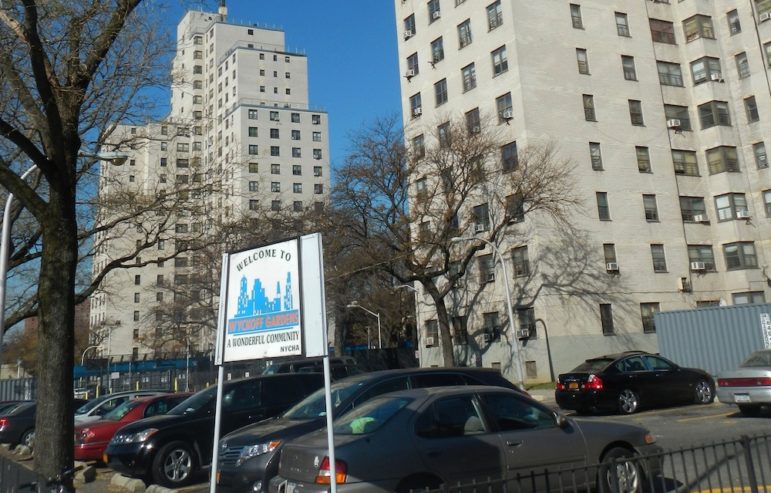
Jim Henderson
Wyckoff Gardens is one of seven sites to be named so far in NYCHA's development push.
An attempt to involve residents in NYCHA’s selection of the developer for income-targeted and market-rate housing at a Brooklyn site has faltered over whether tenants can bring a lawyer to meetings.
That lawyer was barred from attending a meeting in late February and, after NYCHA refused to relent, public-housing tenants at the Wyckoff Gardens development refused to attend an orientation session scheduled for late last week.
“This thing is a quagmire,” says Craig Holmes, chairman of the Wyckoff Gardens Stakeholder Committee, who has lived at Wyckoff for 50 years.
Wyckoff Gardens is one of two NYCHA developments named so far where the de Blasio administration plans to lease land to private firms that will construct new residential buildings split between affordable housing and market-rate units. NYCHA’s plan for Wyckoff Gardens, located in Boerum Hill, calls for 500 units of new housing, 50 percent of it income-targeted (or “affordable”). Holmes Houses in Yorkville is the other NYCHA property involved in that program.
A separate initiative to construct 100-percent income-targeted housing is also underway. Developers were picked last spring to build at Brooklyn’s Ingersoll and Van Dyke developments and Mill Brook houses in the Bronx. NYCHA took bids last year on seven* more such developments for the Betances V and VI, East 165th Street, Twin Parks West, Sumner, Harborview and Morrsania.
No public-housing residents will lose their apartments in the deals but the creation of new housing on NYCHA territory is controversial. The use of public-housing land for market-rate apartments strikes some as a betrayal of the authority’s founding purpose. Many residents and advocates have expressed concerns that the affordable units created under the program will serve more affluent people than currently live in each area, spurring gentrification in the broader neighborhood. Critics also fear the creation of a two-tiered NYCHA, with shiny buildings for newcomers next to crumbling older structures housing long-term residents.
NYCHA has pledged to use money from the new development projects to fix existing buildings. It has provided little detail on its revenue projections, however.
Toward the end of his term, Mayor Bloomberg also attempted to develop housing on NYCHA territory, though his approach involved a lower share of affordable apartments. That effort was derailed by tenant opposition. Under de Blasio’s NYCHA Chairwoman Shola Olatoye, the authority has tried to avoid that fate. It has moved to better engage tenants on several fronts, including around the proposed new developments. At Wyckoff Gardens that meant the creation of the stakeholder committee to provide input on the project. A subset of that committee was to be allowed to review at least some of the bids submitted for the work there.
However, the stakeholder committee has wrestled with NYCHA over the details of the smaller bid-review group. NYCHA restricted the smaller group to tenants, barring advocates from attending, and insisted that attendees sign a confidentiality agreement. At first, the authority would permit only five tenants to be involved, but that has grown to 10.
Now the sides are jousting over exactly what role the group will play and whether they can have a lawyer with them.
Asked why he wants a lawyer present, Holmes answers: “Just support. Because the whole thing is, we have to sign a confidentiality agreement. I understand all that. I’m not college-educated. But that’s not my field of expertise.” Holmes says he wants to be sure he understands when that confidentiality promise in binding and what it means. He is worried that once he signs it, he will be unable to get feedback on what he learns in the review sessions. NYCHA has a large support staff, he notes, and he is confused about the reluctance to allow tenants to have one of their own. “With a lawyer, it keeps things above board.”
In a Wednesday email shared with members of the stakeholder committee, NYCHA executive vice president for external affairs David Pristin refused a request to relent on the prohibition against legal counsel for the advisory group. He wrote: “We do not expect any legal issues to come up in this process that couldn’t be dealt with outside of the RFP process, and NYCHA and [the Department of Housing Preservation and Development] will be providing resident reviewers with support through this process and will be available to answer residents’ questions.” Pristin added, “We do not expect residents to provide feedback on the more technical elements of the RFP — e.g. financing and massing analysis” but rather to stick to a list of tenant concerns created earlier in the process.
In a statement, NYCHA said, “Improving residents’ quality of life is at the heart of our development work, which is why we’ve created a process that includes an unparalleled level of transparency and community engagement. Including lobby meetings, door knocking, community meetings, robocalls, the creation of a resident and community stakeholder committee and an unprecedented RFP process at 50/50 sites to include residents.”
NYCHA’s development efforts are aimed at bolstering the mayor’s affordable-housing plan and shoring up the authority’s shaky finances through the lease payments generated by the deal. NYCHA has reportedly identified 80 sites for new development. The authority’s NextGeneration plan set a goal of creating 10,000 units of affordable housing on NYCHA land. The three 100-percent-affordable deals for which developers have been selected comprise only 489 units, with another 800 total units in play at Wyckoff and Holmes.
In a briefing for reporters last month, Olatoye said the authority was “a major part of the mayor’s affordable housing plan” but stressed that the focus was also on NYCHA’s bottom line. “Look, we have to raise additional revenues, and the way we do that is through our development pipeline,” she said. “We’re really made a commitment to the idea that the city needs more affordable housing while we also need revenue.”
NYCHA characterizes the level of tenant engagement at Wyckoff as “unprecedented,” although the development projects are themselves novel. Craig Holmes is not especially impressed by the engagement efforts. “Why have a steering committee if you’re going to keep dictating?” he asks. “They want engagement when it benefits them.”
*Correction: The original version of the article incorrectly said only two additional sites were out to bid. In fact, seven are. It also omitted the official name of the committee, which is the Wyckoff Gardens Stakeholder Committee.


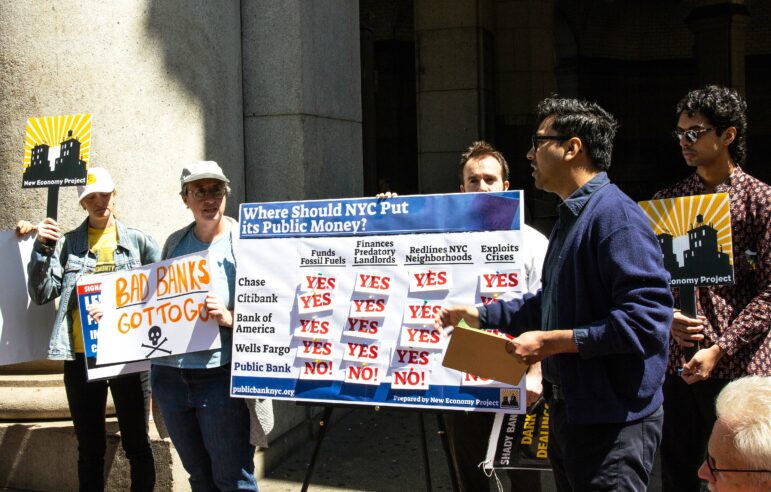

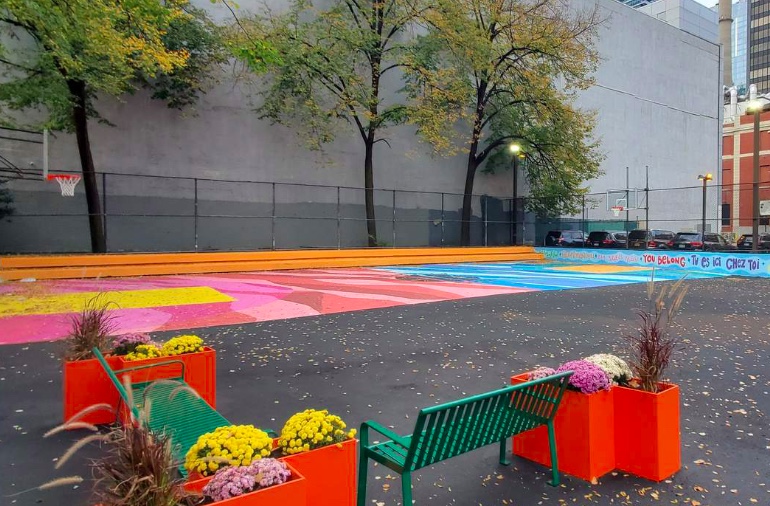
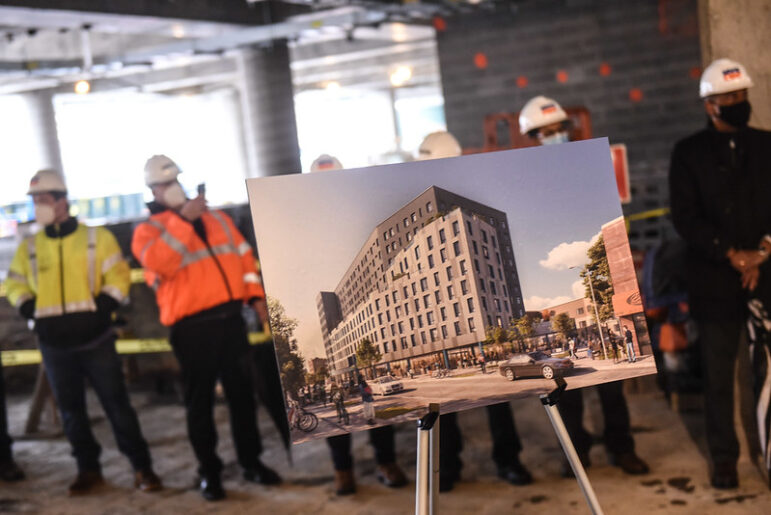
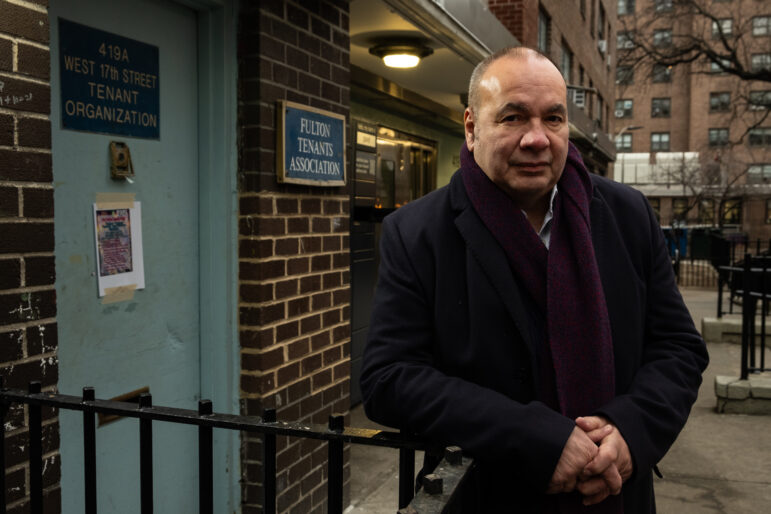


7 thoughts on “NYCHA Blocks Lawyer for Tenant Advisers on Development Project”
I live in this development and was on the committee,these ladies and men have work very hard to get this done. This group has been blocked in every way. I feel that NYCHA just wants it to look like they are work with the community,but does not want in put from them. First they wanted outside community in put than they didn’t, next they want community based organization now they done. NYCHA WORK WITH THIS GROUP PLEASE.
I have been the Chairman of the Wyckoff Gardens stakeholder since the beginning and we have work hard to be a part of this process. We gave our support to NYCHA throughout this
ordeal and know here is a new stumbling block. What else do we have to do. To correct the article I am college education and we are the handpicked Wyckoff Gardens Stakeholder Committee. NYCHA has cut off all contact with the committee. So what are they going to continue to seek people who just agree with there concerns?
Mayor Bill DeBlasio failed housing plan it taking from the poor and giving to the rich, the one term mayor has taken political tips from robin hood and the thieves
NYCHA keeps trying to get away with murder Beverly is smart and savvy. I am surprised that the Fifth Avenue Commitee is not doing more to help these tenants. They, like the mayor, talk the good talk, but when push comes to shove, they do what they want. Is it because their head is a de Blasio loyalist, hides City Planning appointee? Ask Beverly.
George at the RedHookStar-Revue.
The city is under no obligation to sell this land that was set aside by the Federal Government for exclusive how sing of low income families. NYCHA Authority was created with the responsibility to manage these properties for low income families exclusively. To cater to any other income class on this land is a breach of both Federal law and NYCHA’s Authority. It is also a breach of the Public trust. This is the same concept used againot the Native American indians, and other minority groups. The government takes the land claiming it is for our benefit. Then we lose the rights to the land and it’s use. It is the City and it’s corrupt NYCHA Administration that then squanders and plunders any monitary value to feed their own existence at the expense of the poor. When the government is corrupt, where can the poor turn for justice? We must resist!
.
Although I realize the need to balance NYCHA’S economic ability to manage one of the, if not the largest, Public Housing Community in the Country, I don’t think that putting NYCHA properties in harms way of the ravenous gentrification occuring throughtout the city, is the answer! Admittedly, I don’t know how the economic balance between low rents and subsidies and upward spiraling cost of property maintenance/management can be achieved by NYCHA and ultimately HUD ((whose funding resources have to provide/compensate for the disparity between rental income and management expenses “Nationally”!!)), However I believe that it is crucial to have meaningful Resident involvement and input, in a transparent process, along with whatever legal and technical advice they (Residents) deem necessary to facilitate their accurate comprehension of all the aspects of any proposed solution!!
If an effective, progressive partnership is to exist I think that the onus is on the NYCHA to initiate such a partnership, in that they overwhelmingly have the professional expertise in their arsenal!!
The Relationship between the Residents and the NYCHA can not produce meaningful change and cooperation if it is and remains adversarial, may ultimately result in a dictatorship with Residents being the subjects!!!
Keeping it real here – the city, under any Administration, will have to deal with the broader facts and challenges- to serve the needs of a growing economy, including the needs of people who are looking to get plugged into that economy with better transportation, safer and healthier homes so that folks in Section 8 have a chance to break the cycle of poverty and so that buildings, which contributing to climate change because of the poor energy efficiencies that many buildings have – it is simply a mountain of things that NEED to be dealt with, and it is better to understand this before rejecting help, even though it comes with needed money from people who don’t really care. They want to develop and tenants cannot be left behind. So, the bottom line means that tenant reps should not be trying to blow up any effort to help, but rather trying to ensure that the homes they can legally stay in are safe, healthy and close to universal access transportation- so that the disabled and truely needy can live in community grounds that will have playgrounds, access to conveniences that enable self reliance.